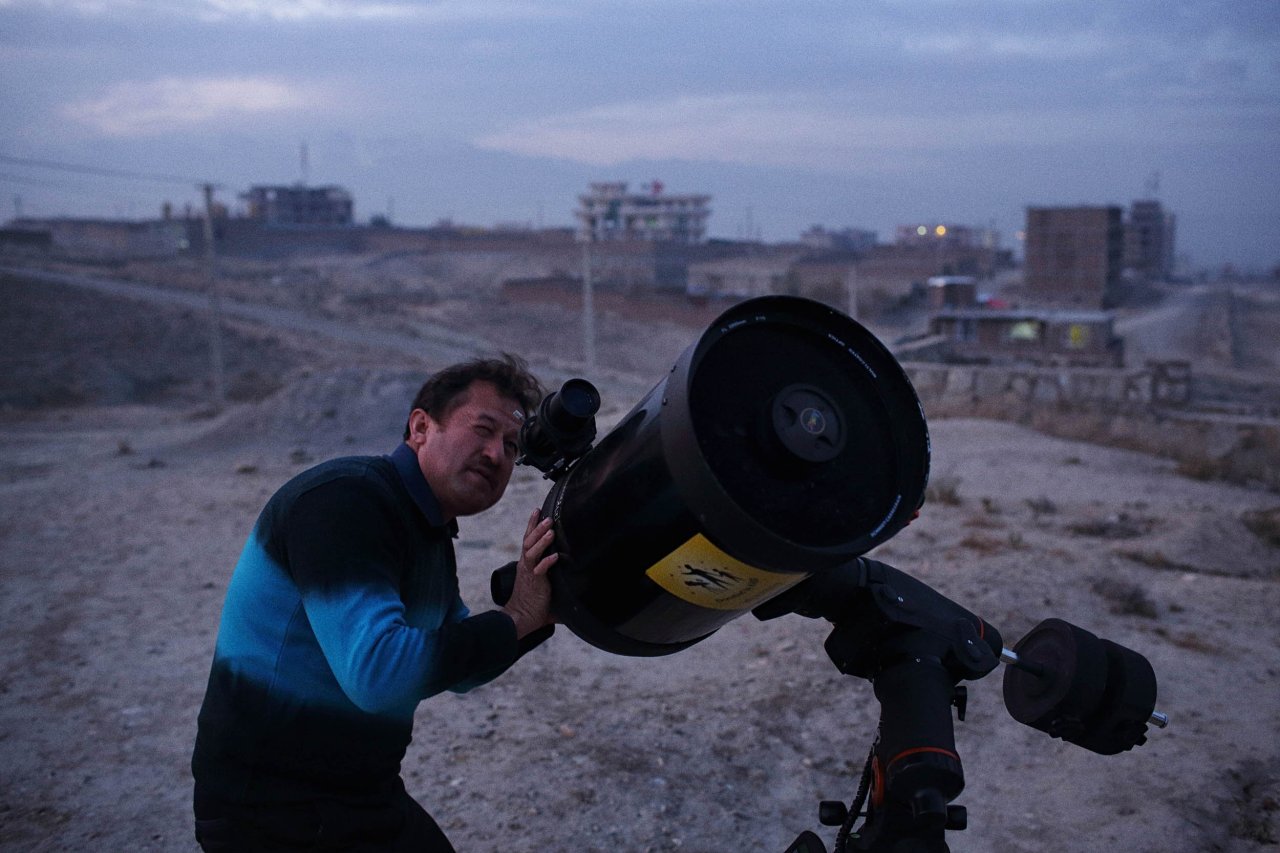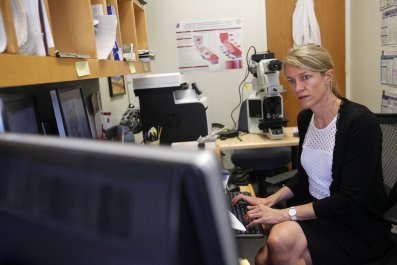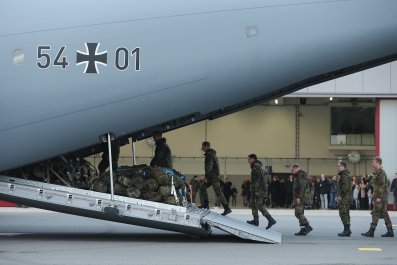One night a few years ago, Yunos Bakhshi and a small group of friends drove out in the darkness to a field about 15 miles from Kabul. For the Afghanistan Astronomy Association, it looked to be the perfect night. They had been assured the field had been cleared of land mines, and the Taliban weren't usually active in the area.
Illumination from Bagram U.S. military base blazed in the distance, emanating an annoying level of light pollution, the astronomer's most common enemy. But the sky was otherwise dark and clear; good enough conditions to observe the Messier 4 star cluster from their modest telescope. Bakhshi and his friends lit a barbecue and began to align their tripod-mounted telescope to locate the bright mass of stars, found in the Scorpius constellation.
After a few minutes, they noticed a car's headlights bumping toward them across the field. Suddenly, the group was surrounded by agitated police officers, guns pointed.
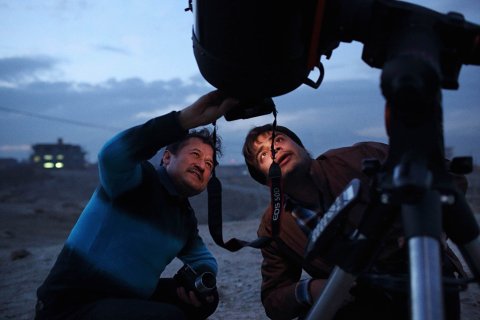
In most of the world, an amateur astronomer can drive to a dark place, set up a telescope and enjoy the beauty of the sky above. But in Afghanistan, a country plagued by 36 years of war, a few men gathered around a telescope pointing toward the sky, in the middle of nowhere, looks pretty suspicious. From a distance, the police thought the telescope might be a rocket launcher.
After careful inspection, the police still couldn't comprehend why anyone would sit in a field, in the cold, to look at stars. Although they'd never seen a telescope before, they conceded that this probably wasn't a weapon.
Calling the astronomers halfwits, the police left. Spooked, most of the stargazers took off too, leaving Bakhshi and two others. Shortly after, they heard helicopters approaching. Terrified that international forces might have mistaken them for insurgents, they lay flat on the ground, praying the night-vision of the pilots would be clear enough to recognize a telescope. The helicopter passed over without incident, but as Bakhshi says, "To say that it is a little bit difficult for us is an understatement."
Afghanistan's war has taken a devastating toll on civilians: death, displacement, poverty. But it also affects lives in unexpected ways. For the country's small band of amateur astronomers, exploring the universe's deepest corners is a risk they now rarely take. The increasing encroachment of the Taliban, criminal gangs and aggressive police checkpoints means they now limit observations to the outskirts of Kabul city or their rooftops. "The places where there are the darkest skies, almost all those places are insecure," says Ibrahim Amiri, 26, one of the youngest members of the Afghanistan Astronomy Association.
His eyes shine as he describes the high altitude and low light pollution of Badakhshan in the north and the open horizons of Kandahar in the south, both perfect regions for stargazing. "But we could be attacked by anyone [there]. Not just Taliban or ISIS, but even the local people," he explains. "Afghans, especially villagers, are usually not very comfortable with people they don't know or things they don't understand."
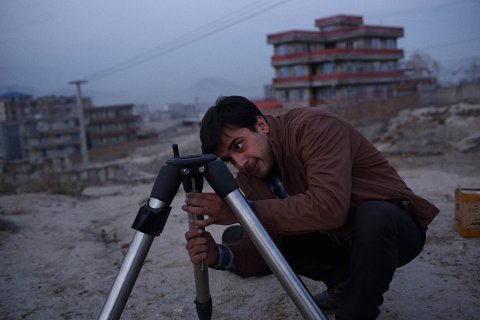
The majority of people in Afghanistan don't understand even the basics of astronomy. Celestial events often feed superstition or are explained through astrology. When Bakhshi went to the Ministry of Justice to register the Astronomy Association, an official held out his palm and asked him to read his future.
Many misunderstandings and superstitions continue to be taught in some mosques. During a lunar eclipse, one of Amiri's neighbors frantically banged on all the doors, pleading for everyone to come outside to pray. Amiri tried to explain that there was no reason to be fearful; eclipses were natural, predictable events that had occurred for billions of years. "No," Ibrahim recalls his neighbor saying. "This is a critical point. You must come and pray, or God will be angry."
Mohammad Naser, a taxi driver, says he also prays during eclipses, at the advice of his local mullah. "We must pray so Allah will return the moon," he says.
Pregnant women are often advised not to touch their faces during an eclipse, as it could result in a birthmark on the child's face. Another common superstition warns that a pregnant woman who touches a knife during a cosmic event, such as an asteroid passing, risks causing disability or malformation to her unborn child, such as a cleft lip.
Bakhshi is on a mission to teach as many Afghans as possible astronomy as a science, to provide an alternative to superstitious or religious explanations. There have been uncomfortable moments for Bakhshi during his voluntary lectures, which he usually gives at private schools in his spare time. Suspicious teachers have asked him how the Big Bang theory can co-exist with Allah's creation of the Earth in six days. When looking through a telescope, one teacher asked to see the split in the moon, a miracle attributed to the Prophet Muhammad. "I try not to argue over the issue but propose another point of view," says Bakhshi. He tells people, "It's up to you to find your answers."
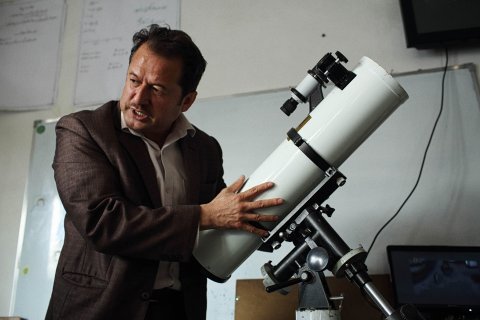
"We're not focused on proving to people that science is against religion," adds Amiri. "I personally don't think astronomy conflicts with religion at all."
During Europe's Dark Ages, Islamic civilization bounded ahead in both astronomy and physics. Muslim astronomers built observatories all over the Islamic world, refined and revised Greek astronomical theory, and they made breakthrough improvements to astronomical instruments, all of which has had a major role in shaping modern-day science. "For many educated Muslims, the Koran is not to be read as a book of science," says Nidhal Guessoum, an astrophysicist at the American University of Sharjah in the United Arab Emirates. Rather, its aim is "to point to God's glory and purpose behind his creation." However, Guessoum says, conservative views have at times interfered with science's acceptance. "Ever since science started to reveal some aspects of nature or the universe that were in disagreement with traditional views, some conservative Muslim scholars have cautioned against the scientific theories or results that do not fit with that traditional picture," he says.
Bakhshi firmly believes astronomy expands personal horizons, creates empathy and combats radicalism.
On a recent Saturday morning at Kabul's Marefat High School, Bakhshi paid a visit to inaugurate the school's very first astronomy club with the donation of a telescope. The class was besotted. Usually, the presence of a foreign photographer would send Afghan teenagers into fits of giggles, but on this day they were intently focused on Bakhshi's explanation of how to use the telescope.
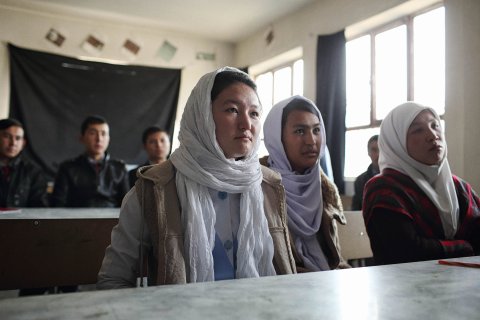
Afterward, Abdul Basir, a 16-year-old student who introduced himself as the "Afghan Einstein," due to his love of physics, said after he first heard Bakhshi talk about the solar system, he asked his father to take him out of the city to look at the stars. "It really pushed me to think about how life is created and what our future is," Basir said of that night. That moment led him to think about issues like humanity and climate change, he said, and "why we are here and how we will live in the future."
On another late afternoon, as the sun disappears and the evening call to prayer echoes across the city below, Bakhshi, Amiri and a small group of men gather on the outskirts of Kabul. As he sets up a large telescope, cigarette dangling from his lip, Amiri recalls the first time he saw the moon up close. In an old schoolbook, he had discovered a guide to making a telescope and managed to fashion one out of an old chimney pipe. "I couldn't move my eye away from the telescope that night," he says.
One by one, the men peer at the moon through the telescope. The clarity is remarkable; the moon luminous and rugged with craters and mountains. For those who are looking through the telescope for the first time that night, each has the same reaction: astonishment and wonder, followed by a barrage of questions.
Mike Simmons, president of Astronomy Without Borders, an organization that supports amateur astronomy globally including in Afghanistan, says he is not surprised. "[The reaction] is really very much always the same…. Anywhere on the planet, when people see Saturn or the moon for the first time, they are just amazed by it."
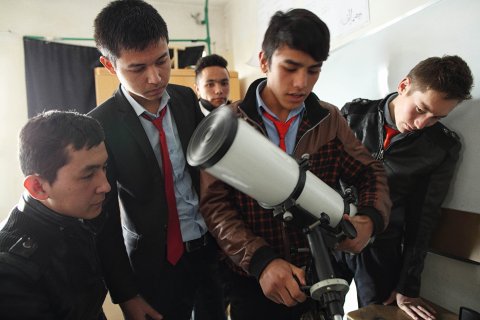
Seeing the solar system up close, Simmons says, "is akin to someone climbing on top of their house for the first time and seeing that there are lots of other houses, maybe some mountains and the oceans: It provides perspective for your own life."
When initially seeing Earth from space, some astronauts have experienced what is known as the "overview effect," a cognitive shift in awareness. They suddenly see our planet as a tiny, fragile ball of life, and at that moment, national boundaries vanish and conflicts seem insignificant.
In Afghanistan, a country where strife and disappointment never end, and suspicion of the unfamiliar is rife, that perspective of the vastness of the universe is important, says Bakhshi.
Packing up the telescope, Amiri says astronomy has helped open his mind. "Once you get in there, you stop thinking about the politics, the little stupid conflicts that [are] happening," he says. "And you start wondering about all the other amazing things out there."



